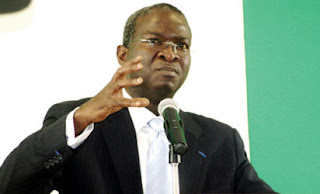Okada is the name commonly used
to describe commercial motorcycles in most parts of Nigeria. The name Okada was
derived from Okada Air, the now defunct local airline popular in the 80’s.
Okada Air earned its reputation by flying routes other airlines shied away from.
It was considered the “all weather” airline and though not known for its
comfort, if you needed to get to your destination as planned, you’d fly Okada.
The name Okada was “borrowed”
from the airline and conferred on commercial motorcycles because they provided
the same efficiency the airline was attributed with. The use of motorcycles as a means of
transport gained momentum in the 90’s largely due to poor road infrastructure
in many parts of Nigeria especially the urban areas. Okada motorcycles gradually
became a mainstay as population outgrew development. The infrastructure
couldn’t support the population growth and while big cities like Dubai and London
built subway stations, successive governments in Nigeria handed out thousands
of Okadas as poverty alleviation strategies. The Mumbai Metro is under construction in the Indian. The system is
designed to reduce traffic congestion in the city, and will be built in three
phases over a 15-year period, with completion expected in 2021. This is
planning. They could have easily banned tricycles to attain the modern city
status overnight.
The Lagos state government has
begun to enforce its ban on Okadas from plying 475 routes within the
metropolis. The Babatunde Fashola led government in its bid to “sanitize” the
city has embarked on a journey that may prove difficult. Like most African
leaders, he has gone all out against the symptom and not the disease.
To say the immediate impact of
this enforcement has made life miserable for Lagosians is an understatement. First
of all, the number of people who have to trek long distances; Ikeja to Akowonjo,
Agidingbi to Allen, Mobolaji-BankAnthony to Opebi, to mention a few is too large
to turn a blind eye to. Hundreds of people clump around bus-stops hoping for
buses that never come. The already excruciating traffic situation has been
worsened because commuters who would rather leave their cars at home are now
forced to drive to work. It took me over 3hours to get from Ilupeju to Ogudu last
week!
There is also the issue of adding
to the already saturated labor market. It is hard to figure out what the
thousands of Okada riders would do in the mean time. How will their families survive?
These questions have to be addressed. They cannot just be wished away. I must state here that I have never liked
Okadas. They have brushed my cars several times and sped off without apology.
And when they do apologize, they wave a whimsical “sorry” as though that would
fix my side mirror. They have no respect for traffic rules. They do not wait
for street lights and truth be told, they serve as quick “get-away cars” used in
robbery operations. Going by the
statistics put forward by the Lagos state government, the number of Okada
related accidents is staggering. Many have lost their lives because Okada
riders are a law to themselves.
 The issue now is how to find a
middle ground. How do we harness the benefits of Okadas without their liabilities?
Lagos is not a modern city, at least not yet. Modern cities like Amsterdam, Paris,
Dubai and Helsinki don’t have Okadas because they have good roads. London with its
Oyster Card has one of the best local transport systems in the world. Speed trains
span the lengths and breadths of these developed cities. They achieved all this
by carefully planning and building infrastructure.
The issue now is how to find a
middle ground. How do we harness the benefits of Okadas without their liabilities?
Lagos is not a modern city, at least not yet. Modern cities like Amsterdam, Paris,
Dubai and Helsinki don’t have Okadas because they have good roads. London with its
Oyster Card has one of the best local transport systems in the world. Speed trains
span the lengths and breadths of these developed cities. They achieved all this
by carefully planning and building infrastructure.
The Lagos state government’s
action will succeed in creating artificial “sanity”. Yes, Okadas won’t scratch your
fenders anymore but these riders may find new ways of being more “productive”
to society.
I want Lagos to grow into a
modern city. The government can work assiduously by passing sound policies and taking
progressive changes. There was a time in Lagos when Molues were the popular
means of transport. But with more Danfos buses and the entrant of the BRT
scheme, they are gradually becoming obsolete. I do not support the argument that
the law be repealed. I’m more inclined towards a more relaxed policy. Okadas
should be banned from roads where speed limit is over 50km/h.
Okada riders have been hunted
down like terrorist. Police rapid response vehicles have been stationed to
impound motorcycles. If a rider leaves in Ikeja but has to work in one of the designated
routes, how does he get there without a police man harassing him? Can he even
carry his wife to church on Sunday? As much I have been an avowed believer in
law enforcement, I would like to see the police employ this level of enthusiasm
in putting arm robbers behind bars. The law was made for man and not the other
way around.
A friend sent me a photograph of Governor
Fashola using Okada riders during one of his election campaigns on the same
roads he has now banned them from. Well as they say in politics: there are no
permanent friends. Eko Oni Baje o.
©2012 Otaigbe Itua Ewoigbokhan
Itualive! ™

No comments:
Post a Comment
Please leave your comments here. They should be related to the material posted. You can also leave suggestions on how you think i can improve the blog. Thank you!